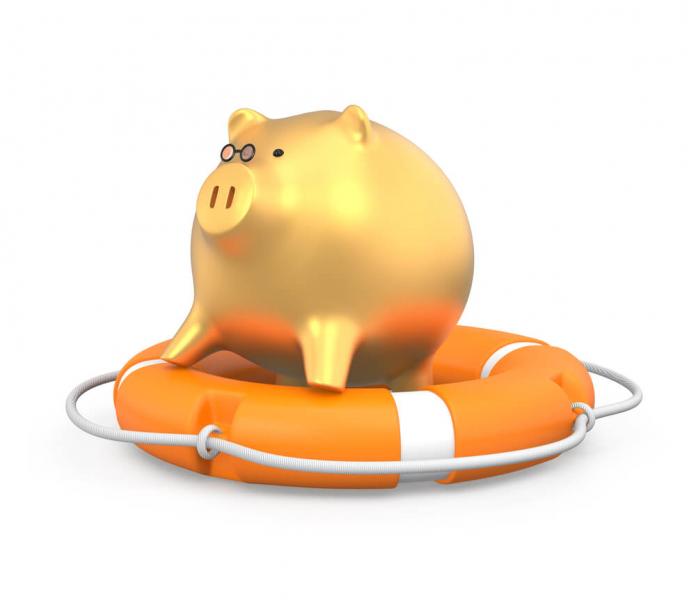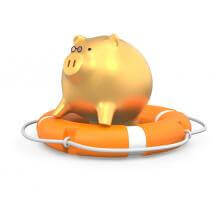Emergency Money for a New Economy
How much reserve money you really need right now?


Why Have An Emergency Fund?
We all know we should have some emergency funds to help us through those unforeseen emergencies in life. You know what I’m talking about: your car won’t start, your computer crashes, you get the flu, your water heater quits working. Or what about the granddaddy financial emergency of them all — you lose your job or business income?
Many people don’t think about the financial “what-ifs?” in life. They happily trot along until some large expense or crisis really throws them. That’s when you want a nice soft cash cushion to land on. The alternative for many is to pull out a credit card and make charges that they really can’t afford.
Definition of Emergency
Emergency funds should be tapped only for real emergencies. Even though it may feel like it at times, taking a vacation is not an emergency! Buying presents, extra clothes, computer games and the like are not emergencies either. The purpose of emergency funds is to keep you healthy and safe during times of unemployment or other unexpected crisis situations.
Eliminate Financial Stress
The solution to dealing responsibly with unplanned expenses is to save up an adequate cash reserve fund. It should be very liquid so you can access it immediately. Having enough money at your fingertips for emergencies shouldn’t be thought of as a luxury; it should be your top financial objective. The stress you can eliminate by having a healthy reserve fund is truly amazing!
Determine How Much You Need
How much is enough? Your reserve goal should actually change as your life and the world around you change. If our current economy has taught us anything, it’s that we can’t know what may be right around the corner. So think of your emergency savings as a moving target that should be reevaluated a couple times per year.
The first step is to accurately figure your monthly living expenses. These are the essentials such as housing, utilities, insurance, food, loan payments, transportation, etc. Add up all your current financial needs and obligations for yourself, your family, and to third parties that you couldn’t or wouldn’t want to cut if your income was seriously reduced.
The second step is to estimate for how long you could potentially need your emergency money. I recommend saving no less than six months’ worth of living expenses. But your unique situation might call for considerably more or less savings. Here are some tips to help you determine how much you should set aside:
-
Be realistic about the stability of your household income. Do you or your spouse work in an industry with volatile consumer demand or one that’s already been steadily declining? If so, this should prompt you to consider saving more than six months of living expenses.
-
Add a safety buffer. Consider adding an additional 10% to your calculated monthly expenses. This will give you confidence that you’ll have enough for job hunting expenses or other surprises that you may have forgotten to estimate.
-
Consider funds you already have saved. If you have savings that aren’t in a retirement account, perhaps you can earmark all or part of it for your emergency fund.
-
Don’t count on selling stuff. When times get tough, it can be difficult to sell possessions, especially if you need the money quickly. So cash is king for your reserve fund.
How to Get Started
Yes, a minimum of six months of expenses is a lot to save. If funding an emergency account seems too daunting to you, begin by taking baby steps. Make a goal to accumulate $1,000, then $2,000, as quickly as you can. Try to steadily build up your reserves until you reach your goal. This might require some sacrifices to reduce spending, especially if you’re like most and are already cutting back.
If you’re not a disciplined saver, here’s a tip: put it on auto-pilot. If you receive a paycheck by direct deposit, ask your employer to split your payment between your regular checking and your emergency account. If you get a paper check or are self-employed, set up an automatic transfer from your checking into your emergency fund. This way you never see the money and don’t even have to think about it.
Where to Keep Emergency Money
Emergency funds should be easy to access, but not so easy that you’ll be tempted to spend them. It’s best to keep reserves completely separate from other accounts. In next week’s show, I’ll cover specific options for the best places to stash your cash. We’ll cover important issues to consider so you can keep your money safe and still working hard for you.
Get a Move On
An emergency fund is one of the most important financial “must-haves.” So there’s no time to spare in getting started. No one said financial security would be easy, but the goal is to be as prepared as possible to survive the tough times.
Administrative
Are you looking for successful strategies to save and invest for a secure future, even during market volatility? Check out my new audiobook, Money Girl’s Guide to Retirement Planning. Find it on iTunes and Audible.com.
I’m glad you’re listening. Chi-Ching, that’s all for now, courtesy of Money Girl, your guide to a richer life.
Emergency Fund image courtesy of Shutterstock

